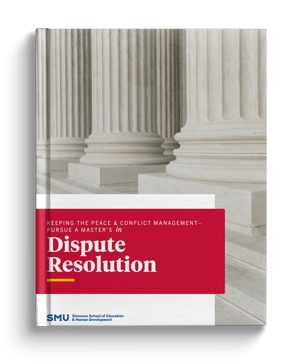Resolving Disputes in Business: Arbitration vs. Mediation & On-Going Executive Coaching

Navigating the intricate web of conflicts within a business setting can be daunting, yet resolving these issues efficiently is essential for organizational growth and success. Businesses are increasingly steering away from the traditional litigation route, opting for alternatives that promise resolution and an opportunity for growth.
In this blog, we will compare typical paths to dispute resolution—arbitration vs. mediation. We will also introduce an innovative third dimension—ongoing executive coaching—as a supplementary approach to resolving conflict and fostering an environment that preemptively mitigates future disputes.
What is Arbitration?
Arbitration involves serving as a neutral third party, known as an arbitrator, to resolve conflicts between two or more parties. As an arbitrator, your role would be to listen to the arguments presented by each side, consider evidence, and make a binding decision to settle the dispute. This process is commonly used in commercial disputes, labor disagreements, and contractual matters.
One of the main advantages of pursuing a career in arbitration is the opportunity to provide swift and efficient resolutions to conflicts without the need for lengthy court proceedings. Arbitrators have the authority to make legally binding decisions, offering a sense of finality and closure to disputing parties. Individuals with a strong sense of fairness, decisiveness, and an understanding of legal principles are well-suited for a career in arbitration.
What is Mediation?
Mediation involves facilitating communication and negotiation between conflicting parties to help them reach a mutually agreeable solution. As a mediator, you would act as a neutral third party who guides discussion and collaboration, encouraging parties to find common ground. This approach is often used in family disputes, workplace conflicts, and community disagreements.
A key benefit of pursuing a career in mediation is the emphasis on empowering parties to find their own solutions to conflicts. Mediators do not impose decisions but instead facilitate open dialogue and creative problem-solving to reach an outcome that benefits both parties. Successful mediators are often skilled communicators, empathetic listeners, and have the ability to build rapport with diverse individuals.
Arbitration vs. Mediation
Individuals interested in a career in arbitration may find satisfaction in applying legal knowledge, analyzing evidence, and making definitive decisions to resolve conflicts. On the other hand, those drawn to a career in mediation may thrive in roles that emphasize communication skills, empathy, and the ability to facilitate constructive dialogue among conflicting parties.
|
Arbitration |
Mediation
|
What is Executive Coaching?
Executive coaching is a dynamic process aimed at enhancing leadership qualities, decision-making skills, and overall performance of individuals in leadership roles. In the context of conflict resolution within businesses, executive coaching empowers leaders to identify, analyze, and address the root causes of disputes effectively.
Executive coaching equips leaders with advanced communication skills, emotional intelligence, and strategic thinking necessary for fostering a culture of open dialogue and mutual respect. Through personalized guidance, goal-setting, and actionable feedback, executive coaching transforms leaders and cultivates a collaborative environment that prevents conflicts before they escalate.
This approach resolves immediate issues and instills a long-term vision for conflict prevention and organizational harmony.
The Dispute Resolution Program at SMU
One effective way to pursue dispute resolution roles is by earning a Master of Arts in Dispute Resolution. This specialized degree equips individuals with the knowledge, skills, and practical experience needed to navigate complex conflicts, facilitate resolutions, and contribute to building peaceful societies.
The MA in Dispute Resolution program at Southern Methodist University is a great option because of our balanced approach to education and practical training.
Blog: What to Look for in a Master’s in Dispute Resolution
|
Pioneering Program in the Region: Our program was the first of its kind in the region, showing a long-standing commitment to conflict resolution education that started back in 2006. |
Interdisciplinary and Practical Approach: Our curriculum offers an in-depth study of conflict theory coupled with the option to specialize. We emphasize hands-on practice through role-plays and active class participation. |
Career Versatility and Relevance: Our graduates are equipped to pursue peacekeeping careers across diverse fields like business, healthcare, public safety, and education. |
If you’re looking to jump into the world of dispute resolution, this program provides a promising path forward. Gain deeper insights into dispute resolution by downloading our free guide: Keeping the Peace & Conflict Management – Pursue a Master's in Dispute Resolution.


